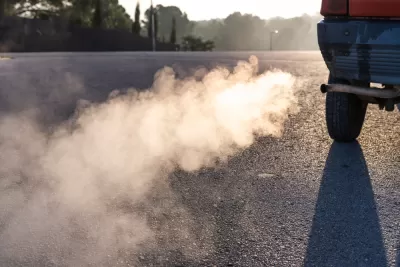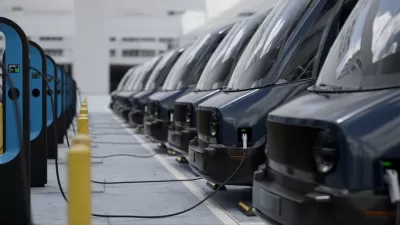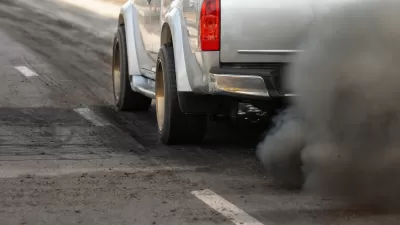A rule shelved during the Trump administration would require states and metropolitan areas to set targets for reducing tailpipe emissions, but advocates say it doesn’t go far enough to mandate results.

According to an article by Jared Brey in Governing, “A recently proposed federal rule would require states and metropolitan planning organizations to set targets for reducing tailpipe carbon emissions on portions of the national highway system that are within their boundaries, and to publicly monitor progress toward those goals.”
First proposed during the Obama administration and rescinded by President Trump’s administration, the rule is being revived to help bring states in line with national emission reduction goals. “Coupled with billions of dollars from the Infrastructure Investment and Jobs Act for carbon reduction and electric vehicle infrastructure — and more modest sums for multimodal transit planning — the administration hopes the rule will help states and metropolitan areas make fewer climate-damaging transportation decisions.”
While the FHWA says the rule, which offers flexibility to states and regions on setting targets and strategies for achieving them, should help “inform better decisions,” critics warn that it “won’t have a real impact on overall emissions without changes to the way mass transit and highway projects are funded.” Advocates say the federal government could do more to require climate considerations and emissions reduction strategies, calling this rule a welcome but inadequate step to address the urgency of the moment.
FULL STORY: States to Target Lower Transportation Emissions Under Proposed Rule

Montreal Mall to Become 6,000 Housing Units
Place Versailles will be transformed into a mixed-use complex over the next 25 years.

Planetizen Federal Action Tracker
A weekly monitor of how Trump’s orders and actions are impacting planners and planning in America.

DARTSpace Platform Streamlines Dallas TOD Application Process
The Dallas transit agency hopes a shorter permitting timeline will boost transit-oriented development around rail stations.

Interactive Map Reveals America's “Shade Deserts”
Launched by UCLA and American Forests to combat heat-related deaths, the tool maps the shade infrastructure for over 360 U.S. cities.

Bicycles and Books — In Sacramento, Libraries Now Offer Both
Adult library card holders can check out e-bikes and e-trikes for up to one week.

Colorado Landfills Emit as Much Pollution as 1M Cars
Landfills are the third-largest source of methane pollution in Colorado, after agriculture and fossil fuel extraction.
Urban Design for Planners 1: Software Tools
This six-course series explores essential urban design concepts using open source software and equips planners with the tools they need to participate fully in the urban design process.
Planning for Universal Design
Learn the tools for implementing Universal Design in planning regulations.
City of Mt Shasta
City of Camden Redevelopment Agency
City of Astoria
Transportation Research & Education Center (TREC) at Portland State University
US High Speed Rail Association
City of Camden Redevelopment Agency
Municipality of Princeton (NJ)





























